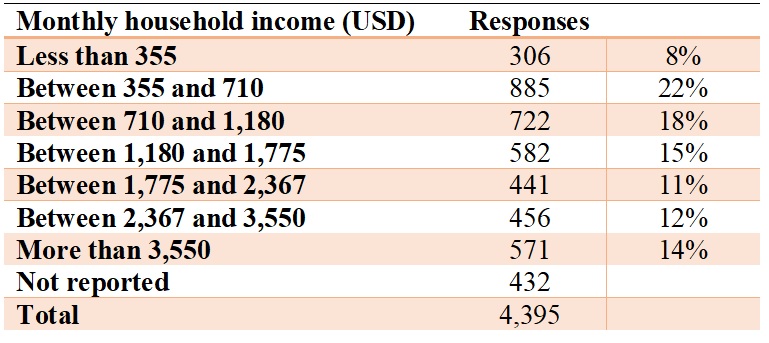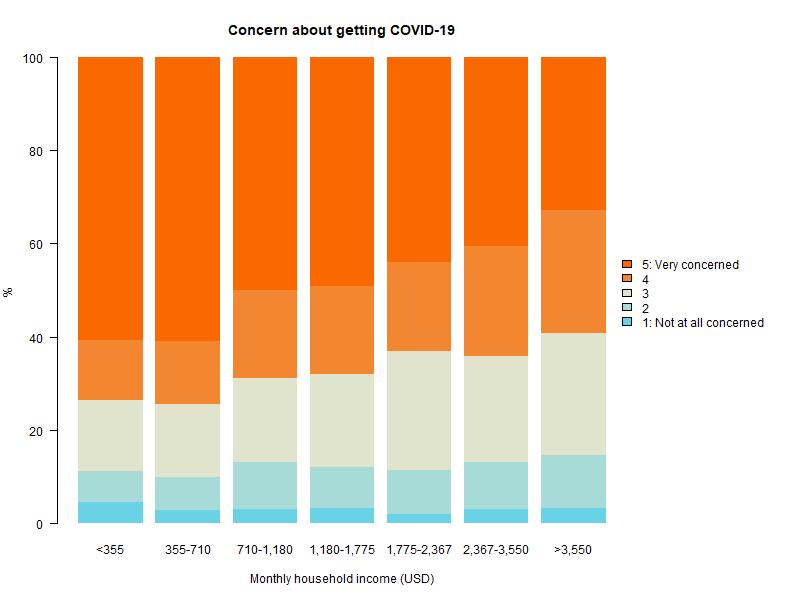Three of every four low-income workers had to go out and work during COVID-19 outbreak in Chile. On the other hand, 80% of high-income workers actually worked from home. Is COVID-19 heightening economic disparity? This, and much more, in this necessary thread #COVIDー19 #COVID19
Results are based on an online survey. Sample: 4,395 adults living in Chile. Survey was open March 23-29 and distributed via online forums, social networks, email, messaging apps, and public transportation apps. Our sample is not representative of the country population, but…
… “representativity” was never our intention. Findings are valid only for this sample. However, we perform analyses based on socioeconomic segments and other relevant indicators when is needed.
48% of our sample belongs to households with a monthly income lower than 1,180 USD. Since the median household income in Chile is 931 USD (Instituto Nacional de Estadísticas, 2018), we are under-representing low-income households. Moreover, we are probably capturing…
…only highest income individuals among low-income people. Survey respondents need access to a phone/computer, internet, and- although it was short- time from their lives in the middle of a crisis. What I will show next could be even more dramatic than what our sample can tell.
Same graph as firs tweet, now more context. 76-78% workers from low-income households (less than 710 USD/month) had to go out and work. On the other hand, 73%-80% of workers from high-income households (more than 1,775 USD/month) worked from home. This is probably correlated to…
… the level of concern on getting COVID-19. Low-income people are more worried about getting the virus. They are more exposed at work than high-income people (see previous tweet), have poor access to health, live in overcrowded neighborhoods, face adverse economic effect, etc.
Do low-income people have other concerns? Sadly yes. Low-income people are particularly concerned about the potential economic effects of COVID-19 outbreak on their family, such as losing their jobs (or source of income) and don’t be able to pay debts.
Low-income people are afraid that they will have to go out (in order to find economic support) and face this disease. In fact, among our survey respondents, low-income people are the segment with the highest level of concern about freedom (of mobility) being severely limited.
(Anyway, this concern about freedom of mobility is the least important looking at the whole sample and is at the bottom of the ranking).
On top of that, Chilean government is imposing the use of face masks on public transportation, charging expensive fines. Since face mask prices have increased drastically amid the pandemic, this is an extra economic stress for low-income households.
More importantly, can a strict quarantine be a possibility if people do not have money for food? This is more than a social justice discussion; it is an urgent question that impacts everyone’s lives.
At this point you are probably wondering “is income the only important factor to understand the effects of COVID-19 in Chile?” Of course not. For example, we would point your attention to:
MOBILITY CHANGES. We asked for the number of trips made by mode and purpose during two consecutive weeks:
Week 1 (W1): March 9 (Monday) to March 15 (Sunday), 2020
Week 2 (W2): March 16 (Monday) to March 22 (Sunday), 2020
Week 1 (W1): March 9 (Monday) to March 15 (Sunday), 2020
Week 2 (W2): March 16 (Monday) to March 22 (Sunday), 2020
Week 1 is considered “normal”, while Week 2 is immediately after the government declared suspension of classes in the whole country (Sunday 15). Also, some companies/institutions started adopting “telecommuting” during Week 2.
In Santiago (73% of our sample), the total reduction of trips was 44%. Modes with highest reduction: metro (55%), ride-sharing (e.g., Uber, Cabify, Didi 51%) and bus (45%). Modes with lowest reduction: motorcycle (28%), auto (34%) and walking (39%) (all of them personal modes)
(As an external validation, we can mention that the Chilean Department of Transportation (MTT) reported that public transportation smart-card transactions diminished 53% and 37% for metro and buses respectively, very close to our survey results (55% metro and 45% buses) )
Regarding trips by purpose, we can see the following reductions during Week 2:
Work: -43%
Study/school: -73%
Other purposes (shopping, errands, medical, leisure, etc.): -38%.
Work: -43%
Study/school: -73%
Other purposes (shopping, errands, medical, leisure, etc.): -38%.
INCREMENT ON REMOTE COMMUNICATION USE. We asked if survey respondents communicated remotely through text, voice, and video during Week 1 (before classes suspension) and Week 2 (after classes suspension) with family members, friends, neighbors, workmates, and classmates.
Usage of remote communication is increased in almost all fronts. Texting and calls increase 1% to 8%, except communication between neighbors in which case the increment is 17% for text and a 2% decrease for calls
Biggest highlight? Video communication increased 55% between family members and more than double between friends, neighbors, workmates, and classmates. What are they talking about? (well, besides classes and work)
We don’t know actually. What we know is they might be discussing some EXPECTATIONS FOR THE FUTURE. Chileans are rather pessimistic about the future after COVID-19.
Regarding the probability of increasing adoption of teleworking in Chile, high-income people believe it is more likely (in comparison to low-income individuals).
Survey respondents believe that is very unlikely that social security and the public health system improve in Chile after the pandemic is over. Low-income individuals are the more pessimistic on this matter.
In conclusion: low-income people are more exposed, more afraid, and, sadly, the least hopeful about our public health and social security system.
That’s it for today. To be continued. Stay home (if you have the privilege to do so).
Rest of @centroIsci team: Alejandro Tirachini ( @AleTirachini), Marcela Munizaga ( @mamuniza) and Angelo Guevara from @uchile ; Juan A. Carrasco ( @juanan_carrasco), Macarena Figueroa and Valentina Torres from @udeconcepcion ; Ricardo Hurtubia ( @rhurtubia) from @ucatolica .
A massive thank you to everyone who participated in and shared our survey (special thanks go to @TuTransapp ). We will conduct the second wave of our survey soon.
I allow myself to tag some people who might be interested on this: @circellag @rodriguez_val @b_rational @drkarenlucas @RosaArroyo @Tomas_TRS @Chiara_05 @humantransit
Some other people who might be interested: @magdalenasaldan @rachelmourao @ahmedelgeneidy @guacamayan @stevenbodzin @UrbanDemog
If you know Spanish, you can read more details here: https://twitter.com/AleTirachini/status/1245871671401013254">https://twitter.com/AleTirach...

 Read on Twitter
Read on Twitter
















